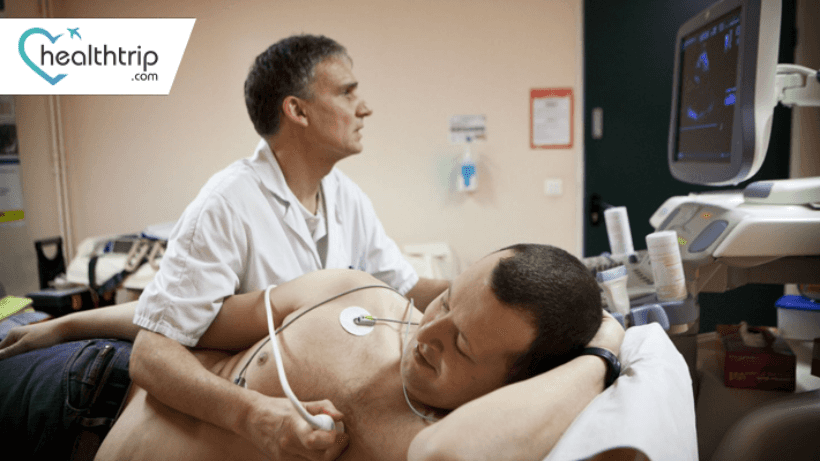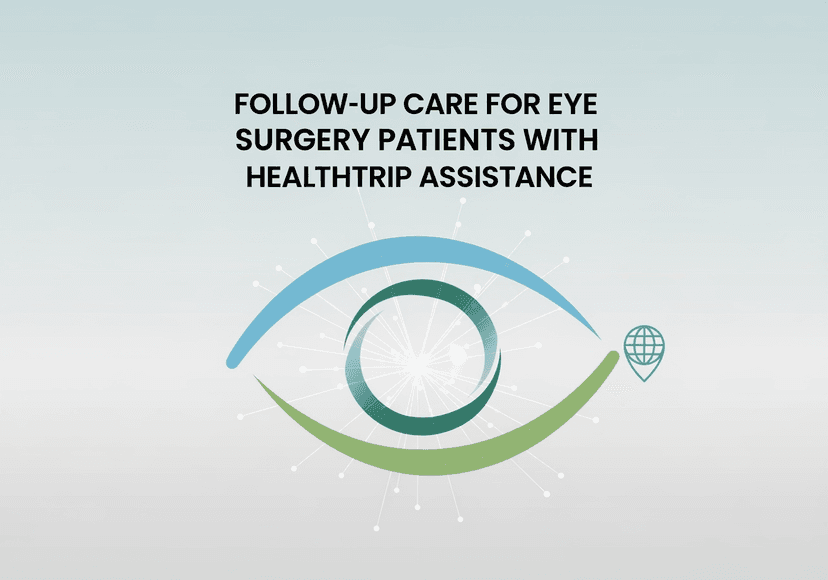
إدارة الذبحة الصدرية وألم الصدر في دولة الإمارات العربية المتحدة
18 Oct, 2023
 هيلث تريب
هيلث تريبيعد ألم الصدر من الأعراض الشائعة التي يعاني منها الأفراد في دولة الإمارات العربية المتحدة وفي جميع أنحاء العالم. على الرغم من أن كل ألم الصدر يدل على وجود حالة طبية خطيرة ، إلا أنه من الأهمية بمكان التمييز بين الانزعاج الحميد وأعراض مشاكل أكثر حدة مثل الذبحة الصدرية. الذبحة الصدرية هي حالة تتطلب إدارة دقيقة لضمان رفاهية الأفراد المتأثرين. في الإمارات العربية المتحدة ، تعد دولة ذات عدد متنوعة من السكان وبنية تحتية للرعاية الصحية المتزايدة ، وإدارة الذبحة الصدرية وألم الصدر لها أهمية قصوى.
فهم الذبحة الصدرية
الذبحة الصدرية هي أحد أعراض مرض القلب التاجي (CHD)، وتتميز بعدم الراحة أو ألم في الصدر يحدث عندما لا تتلقى عضلة القلب إمدادات كافية من الدم الغني بالأكسجين. الأنواع الثلاثة الرئيسية للذبحة الصدرية هي الذبحة الصدرية المستقرة ، الذبحة الصدرية غير المستقرة ، والذبحة الصدرية المتغيرة. تحدث الذبحة الصدرية المستقرة عادة أثناء النشاط البدني أو الإجهاد ويمكن التنبؤ بها. الذبحة الصدرية غير المستقرة لا يمكن التنبؤ بها ويمكن أن تحدث أثناء الراحة، في حين أن الذبحة الصدرية المتغيرة تحدث بسبب تشنجات الشريان التاجي.
الإجراءات الأكثر شعبية في الهند
1. عوامل الخطر للذبحة الصدرية في الإمارات العربية المتحدة
هناك العديد من عوامل الخطر التي تجعل سكان دولة الإمارات العربية المتحدة أكثر عرضة للإصابة بالذبحة الصدرية وألم الصدر:
1. نمط حياة مستقر: يعيش جزء كبير من سكان دولة الإمارات العربية المتحدة نمط حياة خامل بسبب الحرارة الشديدة والاعتماد على السيارات للتنقل.
العلاجات الصحية
امنح نفسك الوقت للاسترخاء
أقل الأسعار مضمونة!

أقل الأسعار مضمونة!
2. ارتفاع معدل انتشار السمنة: تعتبر السمنة مصدر قلق كبير، مما يزيد من خطر الإصابة بأمراض القلب التاجية والذبحة الصدرية.
3. التدخين: لا يزال التدخين عادة شائعة بين بعض التركيبة السكانية في الإمارات العربية المتحدة ، مما يؤدي إلى تفاقم خطر الذبحة الصدرية وأمراض القلب.
4. داء السكري من النوع 2: تعاني دولة الإمارات العربية المتحدة من ارتفاع معدل انتشار مرض السكري من النوع الثاني، والذي يرتبط ارتباطًا وثيقًا بأمراض القلب.
5. ضغط: يمكن أن تسهم مستويات الضغط العالي بسبب نمط الحياة السريع وضغوط العمل في الذبحة الصدرية.
6. نظام عذائي: يمكن أن تكون الوجبات الغذائية التقليدية في دولة الإمارات العربية المتحدة غنية بالدهون والسكريات المشبعة ، مما يؤدي إلى مشاكل السمنة والقلب.
2. تشخيص الذبحة الصدرية
يعد التشخيص الدقيق وفي الوقت المناسب أمرًا ضروريًا لإدارة الذبحة الصدرية بشكل فعال. في الإمارات العربية المتحدة ، يستخدم مقدمو الرعاية الصحية العديد من أدوات التشخيص ، بما في ذلك:
1. تاريخ طبى: يساعد التاريخ الطبي الشامل في فهم عوامل الخطر وتحديد أعراض الذبحة الصدرية النموذجية.
2. رسم القلب (ECG أو EKG): يسجل هذا الاختبار النشاط الكهربائي للقلب ، مما يساعد على تشخيص إيقاعات القلب غير المنتظمة وتحديد النوبات القلبية السابقة.
3. اختبار الإجهاد: تساعد اختبارات المشي أو اختبارات الإجهاد الدوائية في تحديد كيفية استجابة القلب لممارسة الرياضة أو الدواء، وهو أمر بالغ الأهمية لتقييم خطر الذبحة الصدرية.
4. تصوير الأوعية التاجية: يستخدم هذا الإجراء صبغة التباين والأشعة السينية لتصوير الشرايين التاجية وتحديد الانسدادات.
3. فوائد تكلفة إدارة الذبحة الصدرية
قد يتساءل المرء عن فوائد تكلفة إدارة الذبحة الصدرية في دولة الإمارات العربية المتحدة. من الأهمية بمكان أن ننظر إلى ما وراء النفقات الفورية والنظر في المزايا طويلة الأجل.
التدخل المبكر
الإدارة الفعالة للذبحة الصدرية يمكن أن تمنع حدوث مضاعفات أكثر خطورة مثل النوبات القلبية. علاج الذبحة الصدرية في وقت مبكر يمكن أن يقلل من الحاجة إلى تدخلات الطوارئ المكلفة.
تحسين نوعية الحياة
تتيح إدارة الذبحة الصدرية للأفراد أن يعيشوا حياة أكثر صحة ونشاطًا. وهذا يمكن أن يؤدي إلى أيام مرضية أقل وزيادة الإنتاجية، مما يفيد الأفراد والاقتصاد على حد سواء.
خفض تكاليف الرعاية الصحية على المدى الطويل
يمكن أن يؤدي الاستثمار في إدارة الذبحة الصدرية إلى انخفاض تكاليف الرعاية الصحية على المدى الطويل عن طريق منع أمراض القلب الأكثر خطورة والتي تتطلب علاجات طبية مكثفة.
الغطاء التأميني الصحي
تغطي وثائق التأمين الصحي في دولة الإمارات العربية المتحدة عادة إدارة الذبحة الصدرية، مما يمكن أن يقلل بشكل كبير العبء المالي على الأفراد الذين يبحثون عن الرعاية.
4. علاج الذبحة الصدرية في دولة الإمارات العربية المتحدة
تتضمن إدارة الذبحة الصدرية مجموعة من التغييرات في نمط الحياة، والأدوية، وفي بعض الأحيان الإجراءات الطبية. وفي دولة الإمارات العربية المتحدة، يتضمن هذا النهج الشامل:
1. تعديلات نمط الحياة: يعد تشجيع النشاط البدني ، وتعزيز نظام غذائي متوازن ، والدعوة الإقلاع عن التدخين ضروريًا لإدارة الذبحة الصدرية.
2. دواء: يصف الأطباء أدوية مثل النترات وحاصرات بيتا وحاصرات قنوات الكالسيوم لتخفيف الأعراض وتقليل خطر الإصابة بالنوبات القلبية..
3. التدخل التاجي عن طريق الجلد (PCI): بالنسبة للحالات الأكثر خطورة، يتم استخدام تقنيات أمراض القلب التداخلية، بما في ذلك رأب الأوعية الدموية ووضع الدعامات، لفتح الشرايين التاجية المسدودة.
4. التطعيم الشريان التاجي (CABG): في حالات الانسداد الشديد، قد يوصى بإجراء جراحة تحويل مسار الشريان التاجي لإنشاء مسارات جديدة للدم للوصول إلى عضلة القلب.
5. إعادة تأهيل القلب: تعد برامج إعادة تأهيل القلب بعد العلاج ضرورية للتعافي وتبني عادات صحية طويلة الأمد للقلب.
5. دور مرافق الرعاية الصحية في دولة الإمارات العربية المتحدة
في دولة الإمارات العربية المتحدة، لا تعد إدارة الذبحة الصدرية وألم الصدر مجرد مشكلة طبية ولكنها أيضًا انعكاس للبنية التحتية المتنامية للرعاية الصحية في البلاد.. تلعب مرافق الرعاية الصحية في دولة الإمارات العربية المتحدة دورًا محوريًا في التشخيص والعلاج والإدارة الشاملة للذبحة الصدرية. وهنا، نستكشف الدور الهام الذي تلعبه مرافق الرعاية الصحية في إدارة الذبحة الصدرية في دولة الإمارات العربية المتحدة.
بنية تحتية حديثة
إحدى نقاط القوة الرئيسية لمرافق الرعاية الصحية في دولة الإمارات العربية المتحدة هي بنيتها التحتية المتطورة. استثمرت الدولة بشكل كبير في بناء المستشفيات الحديثة والمراكز الطبية المجهزة بالتكنولوجيا المتقدمة. هذه البنية التحتية ضرورية لتشخيص وعلاج الذبحة الصدرية بفعالية.
وحدات أمراض القلب المتخصصة
تحتوي العديد من مرافق الرعاية الصحية في دولة الإمارات العربية المتحدة على وحدات متخصصة لأمراض القلب ومجهزة تجهيزًا جيدًا للتعامل مع أمراض القلب، بما في ذلك الذبحة الصدرية. يتم توظيف هذه الوحدات من قبل أطباء القلب ذوي الخبرة وفرق القلب والأوعية الدموية التي تم تدريبها على تقديم رعاية متطورة.
أدوات التشخيص
إن توفر أدوات التشخيص المتقدمة مثل الأشعة المقطعية وأجهزة التصوير بالرنين المغناطيسي والمختبرات الحديثة يسمح بالتشخيص الدقيق وفي الوقت المناسب للذبحة الصدرية. وهذا أمر بالغ الأهمية لبدء العلاج المناسب.
6. القوى العاملة للرعاية الصحية الماهرة
يعمل في مرافق الرعاية الصحية في دولة الإمارات العربية المتحدة قوى عاملة ماهرة ومتنوعة في مجال الرعاية الصحية. هذه القوى العاملة مفيدة في توفير الرعاية والدعم اللازمة لمرضى الذبحة الصدرية.
أطباء القلب والأخصائيين
يتمتع أطباء القلب في دولة الإمارات العربية المتحدة بالتدريب الجيد والخبرة في إدارة الذبحة الصدرية وأمراض القلب الأخرى. وتضمن خبرتهم حصول المرضى على تشخيصات دقيقة وخطط علاجية مخصصة.
موظفي التمريض
يلعب طاقم التمريض دورًا حيويًا في رعاية المرضى وتعليمهم. إنهم يقدمون الدعم المستمر لمرضى الذبحة الصدرية، ويضمنون فهمهم لخطط العلاج الخاصة بهم والالتزام بها بشكل صحيح.
7. إمكانية الوصول والتوافر
تتميز مرافق الرعاية الصحية في دولة الإمارات العربية المتحدة بسهولة الوصول إليها وإتاحتها للمقيمين في جميع أنحاء الدولة. تعد إمكانية الوصول هذه أمرًا بالغ الأهمية للتدخل في الوقت المناسب في حالات الذبحة الصدرية وغيرها من حالات الطوارئ القلبية.
المستشفيات والعيادات
تفتخر دولة الإمارات العربية المتحدة بشبكة من المستشفيات والعيادات، تتراوح من مراكز الرعاية الثالثية الكبيرة إلى المرافق المتخصصة الأصغر. ويضمن هذا التنوع حصول الأفراد المصابين بالذبحة الصدرية على الرعاية، بغض النظر عن موقعهم.
خدمات الطوارئ
في حالات الذبحة الصدرية الحادة أو آلام الصدر، يعد توفر خدمات الطوارئ في مرافق الرعاية الصحية في دولة الإمارات العربية المتحدة بمثابة شريان الحياة. تعتبر أقسام الطوارئ مستعدة جيدًا للتعامل مع حالات القلب الحرجة وتوفير تدخل في الوقت المناسب.
8. علاج شامل
تقدم مرافق الرعاية الصحية في دولة الإمارات العربية المتحدة خيارات علاجية شاملة للذبحة الصدرية. تشمل هذه الخيارات جوانب مختلفة من الرعاية، بدءًا من الأدوية وتعديلات نمط الحياة وحتى الإجراءات الطبية المتقدمة.
إدارة الأدوية
يمكن لمرضى الذبحة الصدرية الحصول على الأدوية اللازمة، بما في ذلك أدوية النترات، وحاصرات بيتا، وحاصرات قنوات الكالسيوم، لإدارة أعراضهم بفعالية.
أمراض القلب التداخلية
بالنسبة للمرضى الذين يعانون من انسدادات شديدة في الشرايين التاجية، تتوفر إجراءات أمراض القلب التداخلية مثل رأب الأوعية الدموية ووضع الدعامات، والتي يمكن أن تفتح الشرايين المسدودة وتحسن تدفق الدم إلى القلب.
9. رعاية ما بعد العلاج
تعتبر رعاية ما بعد العلاج وإعادة التأهيل عنصرين أساسيين في إدارة الذبحة الصدرية في مرافق الرعاية الصحية في دولة الإمارات العربية المتحدة.
برامج إعادة تأهيل القلب
تقدم العديد من مرافق الرعاية الصحية في دولة الإمارات العربية المتحدة برامج إعادة تأهيل القلب. تم تصميم هذه البرامج لمساعدة المرضى على التعافي من الإجراءات، واعتماد أنماط حياة صحية للقلب، وتقليل مخاطر الإصابة بمشاكل القلب في المستقبل.
متابعة الرعاية
يمكن لمرضى الذبحة الصدرية الحصول على رعاية متابعة منتظمة في مرافق الرعاية الصحية لمراقبة تقدمهم، وتعديل خطط العلاج حسب الحاجة، ومعالجة أي مخاوف أو أسئلة قد تكون لديهم.
10. التقدم المستمر
تلتزم مرافق الرعاية الصحية في دولة الإمارات العربية المتحدة بالبقاء في طليعة التطورات الطبية. يضمن التعلم المستمر والبحث والاستثمار في التقنيات الجديدة أن يمكن للمرضى الذين يعانون من الذبحة الصدرية الوصول إلى أحدث العلاجات وأكثرها فعالية.
المبادرات البحثية
يؤدي التعاون مع المؤسسات البحثية المحلية والدولية إلى رؤى قيمة وأساليب مبتكرة لإدارة الذبحة الصدرية.
اعتماد التقنيات الجديدة
تتبنى مرافق الرعاية الصحية في دولة الإمارات العربية المتحدة بسرعة التقنيات الطبية الجديدة، مما يضمن استفادة المرضى من أحدث التطورات في مجال رعاية القلب.
ختاماً،تعد إدارة الذبحة الصدرية وألم الصدر في دولة الإمارات العربية المتحدة عملية متعددة الأوجه تتضمن التعرف على الأعراض والحصول على تشخيص دقيق ومعالجة عوامل الخطر والنظر في فوائد التكلفة على المدى الطويل. ومن خلال إعطاء الأولوية لصحة القلب، لا يستطيع الأفراد في دولة الإمارات العربية المتحدة أن يعيشوا حياة أكثر صحة وإشباعًا فحسب، بل يمكنهم أيضًا المساهمة في بناء مجتمع أكثر قوة وازدهارًا. لذلك، إذا كنت أنت أو أحد أفراد أسرتك تعاني من أعراض الذبحة الصدرية، فلا تتردد في طلب الرعاية الطبية والبدء في الطريق نحو صحة أفضل للقلب.
المدونات ذات الصلة

Complete Cost Breakdown of Eye Surgery with Healthtrip
Learn about doctors, hospitals, procedures, and recovery for eye surgery

How to Prepare for Your Eye Surgery in India
Learn about doctors, hospitals, procedures, and recovery for eye surgery

Side Effects and Risk Management of Eye Surgery
Learn about doctors, hospitals, procedures, and recovery for eye surgery

Follow-Up Care for Eye Surgery Patients with Healthtrip Assistance
Learn about doctors, hospitals, procedures, and recovery for eye surgery

Best Hospital Infrastructure for Eye Surgery
Learn about doctors, hospitals, procedures, and recovery for eye surgery

What to Expect During a Eye Surgery Consultation
Learn about doctors, hospitals, procedures, and recovery for eye surgery










